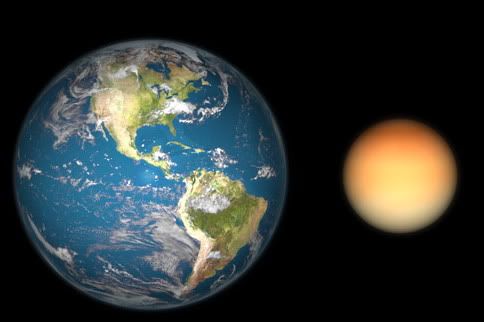Saturn's Moon A Lot Like Earth, Only Different
Earth's little brother Titan among moons
"IT BEARS a striking resemblance to our own Earth - right down to the smog-ridden atmosphere.
Using radar to pierce the thick atmosphere, scientists have mapped a third of the surface of Saturn's planet-sized moon, Titan.
And despite the alien environment, they have revealed an uncanny likeness to Earth, with mountain ranges, dunes, numerous lakes and suspected volcanoes.
And just as on Earth, the weather on Titan appears to have erased most evidence of meteorite craters.
"It really is surprising how closely Titan's surface resembles Earth's," said planetary geologist Rosaly Lopes, from the Jet Propulsion Laboratory, in California.
"In fact, Titan looks more like the Earth than any other body in the Solar System, despite the huge differences in temperature and other environmental conditions."
Dr Lopes presented the latest Titan results at the International Astronomical Union General Assembly in Rio de Janeiro, Brazil.

Gaia and Titan
The US space agency NASA's Cassini probe has been checking Saturn and moons for five years, acting as "mothership" to the European Space Agency probe Huygens which landed on Titan in 2005.
Titan is a super-cooled world with average surface temperatures about -180C, where water exists only as deep-frozen, rock-hard ice.
Methane and ethane do water's work in Titan's hydrological cycle, falling as rain or snow, and forming lakes and drainage channels.
But if you think it sounds too inhospitable for life, think again. The chemical environment on Titan closely resembles early Earth about the time life first emerged.
Titan is the only moon known to have a thick atmosphere, and the only celestial body other than Earth to have stable pools of liquid on its surface.
Dr Robert Nelson, another Jet Propulsion Laboratory researcher also addressed the meeting, saying: "One exciting question is whether Titan's chemical processes today support a pre-biotic chemistry similar to that under which life evolved on Earth."
"IT BEARS a striking resemblance to our own Earth - right down to the smog-ridden atmosphere.
Using radar to pierce the thick atmosphere, scientists have mapped a third of the surface of Saturn's planet-sized moon, Titan.
And despite the alien environment, they have revealed an uncanny likeness to Earth, with mountain ranges, dunes, numerous lakes and suspected volcanoes.
And just as on Earth, the weather on Titan appears to have erased most evidence of meteorite craters.
"It really is surprising how closely Titan's surface resembles Earth's," said planetary geologist Rosaly Lopes, from the Jet Propulsion Laboratory, in California.
"In fact, Titan looks more like the Earth than any other body in the Solar System, despite the huge differences in temperature and other environmental conditions."
Dr Lopes presented the latest Titan results at the International Astronomical Union General Assembly in Rio de Janeiro, Brazil.

Gaia and Titan
The US space agency NASA's Cassini probe has been checking Saturn and moons for five years, acting as "mothership" to the European Space Agency probe Huygens which landed on Titan in 2005.
Titan is a super-cooled world with average surface temperatures about -180C, where water exists only as deep-frozen, rock-hard ice.
Methane and ethane do water's work in Titan's hydrological cycle, falling as rain or snow, and forming lakes and drainage channels.
But if you think it sounds too inhospitable for life, think again. The chemical environment on Titan closely resembles early Earth about the time life first emerged.
Titan is the only moon known to have a thick atmosphere, and the only celestial body other than Earth to have stable pools of liquid on its surface.
Dr Robert Nelson, another Jet Propulsion Laboratory researcher also addressed the meeting, saying: "One exciting question is whether Titan's chemical processes today support a pre-biotic chemistry similar to that under which life evolved on Earth."





0 Comments:
Post a Comment
<< Home